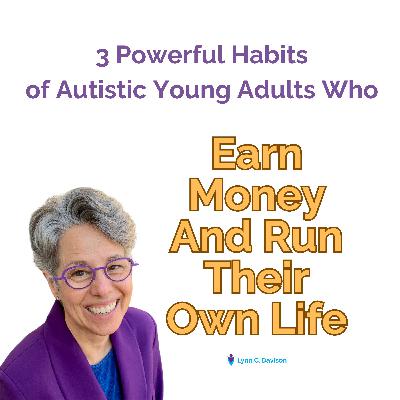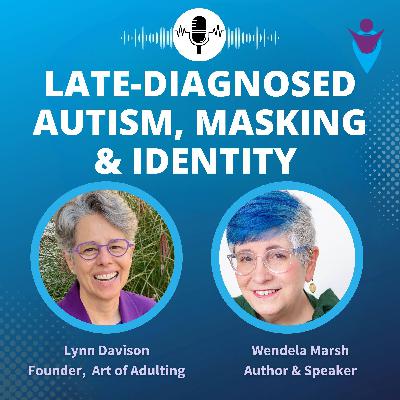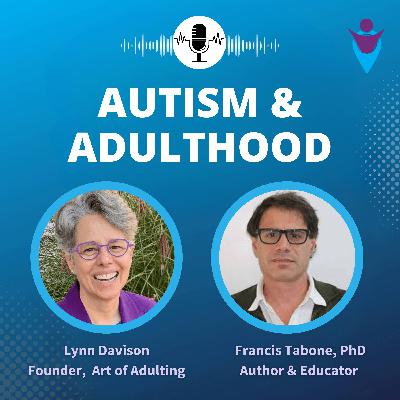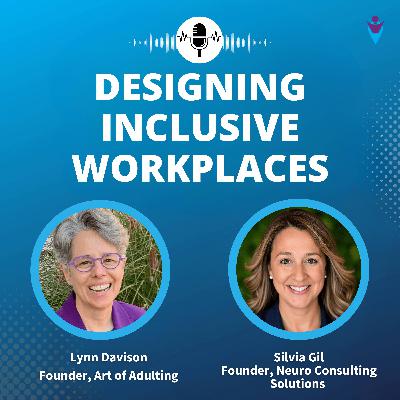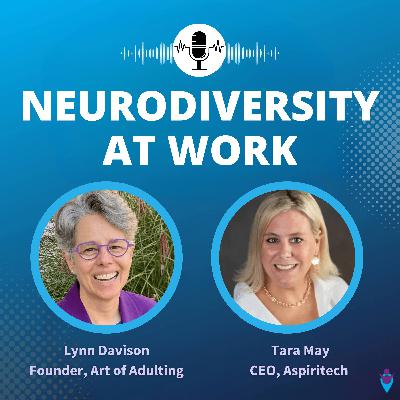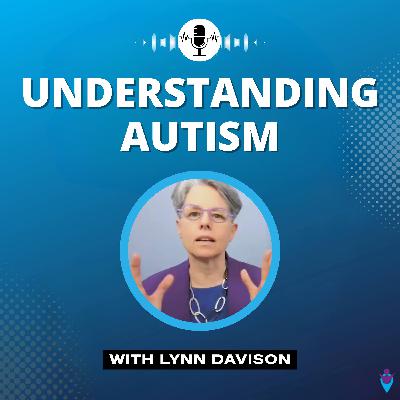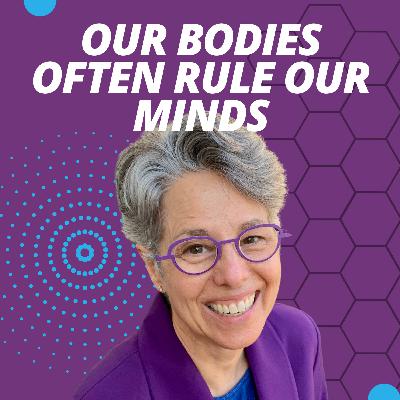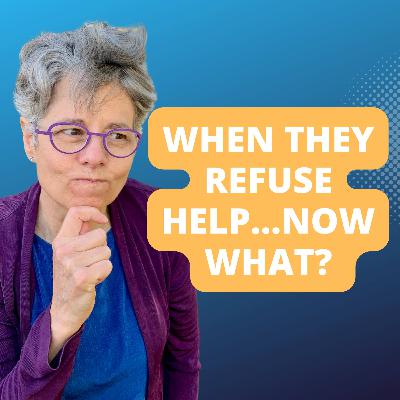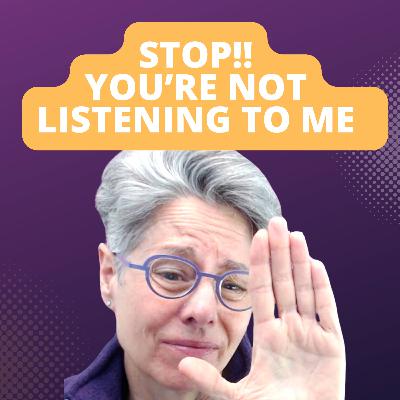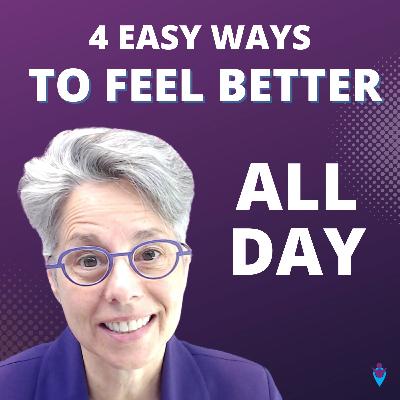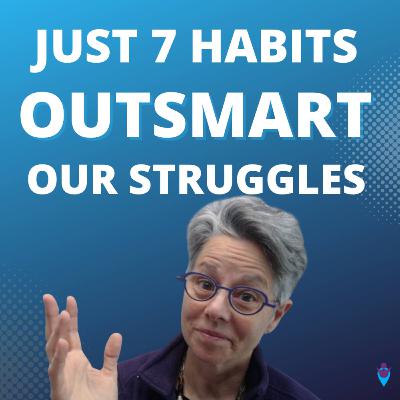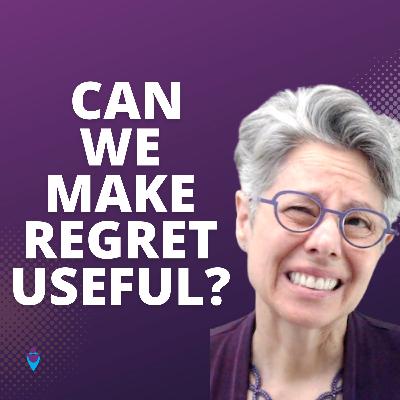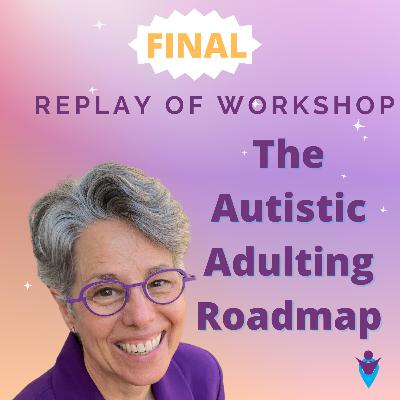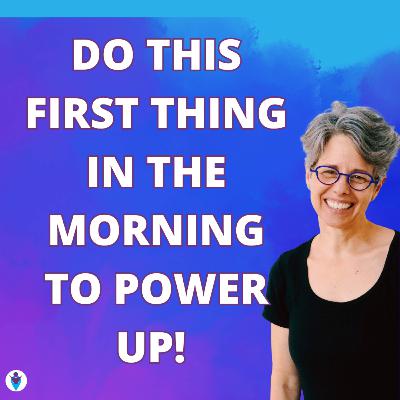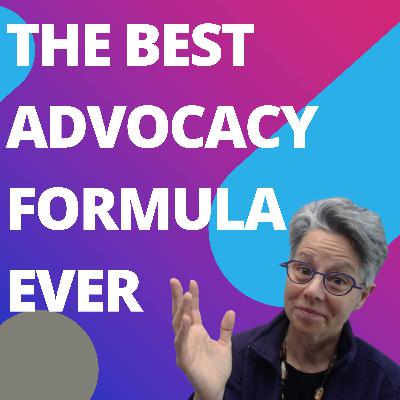Discover When Autism Grows Up STRONG
When Autism Grows Up STRONG

50 Episodes
Reverse
Join Lynn in a powerful, honest conversation with Haley Moss, bestselling author, keynote speaker, advocate, artist, consultant, and the first openly autistic lawyer in Florida. She is one of the most influential voices in autistic self-advocacy today.
Together, they dive deep into what autistic adulthood really looks like, challenging outdated ideas about independence and success. This conversation explores burnout, self-advocacy, interdependence, and the courage it takes to build a life on your own terms—without shame or unrealistic expectations.
From redefining independence to embracing autistic joy, rest, and community, this episode offers clarity, validation, and practical wisdom for autistic adults, families, educators, and allies alike.
You can watch the full video interview here.
In this episode, Lynn Davison discusses the unique challenges of supporting autistic young adults in their 20s and 30s, particularly in the context of the overwhelming choices and distractions created by modern technology. Drawing from her experience raising six neurodivergent adults,
Lynn emphasizes the importance of forming a collaborative support team and understanding both the parents' and graduates' systems.
She introduces three key habits for success: understanding the brain, body, and mind; connecting with strengths and reality; and experimenting to build confidence.
Lynn also touches on creating a solid financial foundation, including understanding government benefits, to ensure long-term support for autistic graduates.
Key Takeaways:
The impact of technology on autistic young adults and the challenges it creates.
Forming a collaborative team for support and success.
1 The importance of understanding the brain, body, and mind to create effective strategies.
2 How to connect with the strengths and reality of neurodivergent individuals.
3 Experimenting to build confidence and resilience.
Join Lynn in a powerful conversation with Wendela Whitcomb Marsh, award-winning author, TEDx speaker, and leading advocate for late-diagnosed, high-masking autistic adults. Together, they dive deep into what it really takes to understand hidden autism, unmask safely, reclaim identity, and build a life rooted in authenticity and acceptance — especially for autistic women, girls, and adults who have gone unseen for far too long.
You can watch the video interview here.
Join Lynn in a powerful conversation with Dr. Francis Tabone, educator, author, and lifelong advocate for autistic and neurodivergent young adults. Together, they dive deep into what it really takes to build independence, dignity, and purpose after high school — and how parents, educators, and communities can better support this journey.
You can watch the video interview here.
In this inspiring episode, Lynn Davison of Art of Adulting talks with Silvia Gil, founder of NeuroConsulting Solutions, about practical ways to design inclusive workplaces and empower neurodiverse individuals.
Listen now and discover how strength-based strategies, visual systems, and universal design can unlock potential and create environments where everyone thrives.
You can watch the video interview here.
In this powerful interview, Lynn sits down with Tara May, CEO of Aspiritech, a world-class QA testing company breaking barriers and transforming the future of autism employment. Discover how Aspiritech is building truly inclusive workplaces, offering FREE job training programs (QA testing, cybersecurity, and more), and helping autistic and neurodivergent adults gain confidence, independence, and purpose. Listen now and learn how Aspiritech is creating jobs, hope, and a brighter future for neurodivergent adults everywhere.
Here’s a summary of my “Understanding Autism PTx” presentation:
Purpose & My Background
• Delivered for Autism Awareness Month by me, a neurodivergent coach with lived experience raising six neurodiverse children.
• The session is aimed at improving understanding, inclusion, and support for autistic individuals.
Key Concepts
1. What is Autism?
• A neurological developmental condition—not a defect, but a difference.
• Autism exists on a color wheel, not a linear spectrum, highlighting infinite variation.
• Neurodiversity is natural and as vital as biodiversity.
2. Origins & Brain Science
• Structural and gene expression differences in the brain are often present from utero.
• Differences are not “less than,” just different ways of perceiving and interacting with the world.
Core Autistic Traits: ESP Framework
E - Executive Functioning Strengths • Deep focus, detail-oriented thinking, strong routines, logical analysis, and honesty. Challenges: • Difficulty initiating tasks, time management, emotional regulation, and flexibility. Strategies: • Use visual schedules, reminders, and structured routines.
S - Sensory Processing Strengths: • Heightened perception, sensory joy, unique emotional ties to stimuli. Challenges: • Sensory overload, avoidance, filtering difficulties, interoception issues, dyspraxia. Strategies: • Create sensory-friendly environments with control over light, sound, and textures.
P - People Skills Strengths: • Honest communication, deep listening, loyalty, and inclusive attitudes. Challenges: • Misreading social cues, discomfort with small talk, processing delays, masking. Strategies: • Build trust through deep, meaningful conversations and non-verbal bonding.
Communication & Inclusion Tips
• Listen: Make space for different communication styles.
• Validate: Acknowledge feelings and experiences without judgment.
• Ask: Don’t assume—ask what’s helpful.
• Offer Support: Gently and respectfully, not forcefully.
Connection Styles Autistic connection may include: • Info-dumping on special interests, • Parallel play, • Blunt honesty, • Scripting (repeating familiar phrases), • Support through action.
Resources Mentioned
1 The Pattern Seekers by Simon Baron-Cohen
2 The Autistic Burnout Workbook by Dr. Megan Anna Neff – helps manage burnout through personalized strategies.
3 Self-Care for Autistic People by Dr. Megan Anna Neff – promotes unmasking, community connection, and neurodivergent health practices.
4 Seeing Autism by Barbara Avila – focuses on creating authentic engagement and supportive environments. Takeaway Message Autism is a different—not deficient—way of being.
When we shift from awareness to acceptance to appreciation, we build a world that works better for everyone. Support should always be led by the autistic individual’s preferences and needs.
I offer 11 Mentor Methods to support parents of autistic young adults transitioning from school to earning money and running their life. I share my personal experiences and those of the members of The Art of Adulting. including 12 actionable tools to address common challenges: setting clear goals, building self-advocacy skills, and fostering resilience.
Key points include:
The importance of structure and mentorship for autistic young adults post-graduation.
Techniques for managing stress, improving listening skills, and encouraging action.
Practical tools like the “3-2-1 Power Up” and “Life GPS” to help set and achieve goals.
A focus on balancing firm expectations with warm support to address procrastination and catastrophizing with compassion.
The Mentor Mindset emphasizes collaboration between parents and their young adults, self-reflection, and long-term resilience for building the life we want together.
In this short podcast, I emphasize the crucial role parents play in shaping the next generation of leaders. I highlight the importance of fostering empathy, critical thinking, and kindness in children to prepare them for leadership roles in the future.
0:02 Hi there. In these moments when the news and social media get loud, and when things feel uncertain, let's remember this important truth.
0:12 What we're doing in our home matters. We are preparing the next generation of leaders. Our kids will be the ones making decisions, leading the way, shaping our culture.
0:29 We golden opportunity to raise a generation of people who see the good inside each other, who are self-reflective, who do their best to understand different perspectives, who believe that multiple truths can exist at the same time.
0:49 I am so hopeful for the next generation. Why? Because you are their leader. You are their parent. They have a story strong leader who sees the good inside them, who models what it means to be empathetic and compassionate, who fosters an environment of open, safe communication, who encourages them to
1:14 think critically and embrace their individuality, who teaches them the value of kindness and respect. So when the news gets loud, remember that we can't control everything that happens outside our doors, but we can control ourselves, and that's how we best influence each other.
1:42 We can cultivate kindness and understanding within our home. We are preparing the leaders who will define the future of our country and our world.
1:55 Let's do it together. Thank you for being you and for being here. Bye for now.
Are shutdowns and meltdowns voluntary? Or are they our body’s way of managing our brain?
Holly Bridges asserts that a shutdown or meltdown isn't willful, it's the nervous system that has learned a safety response to pain and fear.
Let’s get aware of the body's impact on thinking so our autistic graduates can navigate life better.
Here's my summary of Holly Bridge's theory and experience behind her Autism Refame Therapy.
As parents of autistic graduates, we can teach people with autism how to feel calm in their bodies so they connect better with all their systems including social engagement.
When we attune to which body-based calming activities help them get their nervous system centered, we can encourage them to practice those actions regularly. They'll feel better more often and may be able to negotiate life with more comfort.
Holly Bridges | Autism and the Polyvagal Theory: Building emotional and physical resilience through body awareness https://www.youtube.com/watch?v=WShQJa-xUZQ&t=20s
Holly Bridges | Autism Journeys August 2021 https://www.youtube.com/watch?v=E-2PrDy5UJA Holly Bridges | Potency of Dorsal State https://otter.ai/u/gorFNR-h1QiBcdUvCi2f4qpUrkA?utm_source=copy_url
More resources at https://linktr.ee/lynncdavison
Why is avoidance such a common way we deal with life? First, let's recognize that we all refuse help.
For example, it took me a year to complete the 24-hour urine test my doctor recommended because...well, it sounded so gross. I didn't want to do it. Now that I've done it, I've learned how to strengthen my body, in this case to keep my bones strong.
Recently, one of my graduates struggled getting and keeping a good job. So I found help, we got him set up, and then he stopped attending meetings.
Why does this happen and what can we do? Because, let's face it, in these situations we must focus on what WE can do. We know we can't change anyone else but us and change takes work.
In this video I offer:
1 What autistic people NEED (not want) that those of us who love them can help them create,
2 Fifteen ways that I've found work to get through resistance, and
3 Eight ways I know don't work.
For links to more resources, go to https://linktr.ee/lynncdavison
I work with parents who seek me out to problem-solve with their autistic graduates through the tricky transition from school to work.
Parents tell me they feel frustrated, defeated and exhausted.
Their graduates feel anxious and overwhelmed, often escaping on screens where they find success even if it is virtual and they know they are avoiding getting things done.
The traditional behavior-consequence approach doesn't seem to work. Independence is taking longer than anyone would like. They struggle to find a good job and run their life.
In this video, I suggest we stop asking, "What's wrong?" and start with, "What's our struggle (both of us)?" and "What can we do to help?"
I borrow Dr. Becky Kennedy's wisdom outlined in her book, GOOD INSIDE, and suggest we start with the most generous interpretation of whatever we're seeing.
Then we connect our minds and bodies and outsmart the struggle together. That's how we increase independence and happiness in our families.
For links to more resources, go to https://linktr.ee/lynncdavison
The problem with parents is that we think we know best. To be fair, we often do. For sure we know we have our graduates' best interests at heart because we love them.
Unfortunately, graduates often avoid listening to parents. They believe they've heard it already, or that their parents just don't understand them well enough to offer good options, or that they are just criticizing. To be fair, parents do tend to suggest, advise and criticize.
Many of us struggle with the listening to each other.
- We worry that listening to what seems like an overreaction is indulgent.
- We might feel strange reflecting something that makes absolutely no sense to us.
- We wonder if we could actually reinforce the inflexible response when we listen.
But listening isn't about agreeing — it's about acknowledging others' emotions and experience -- and that they matter.
It's letting them know that it's okay for them to feel what they feel so they can, over time, figure out how to tackle the challenge in a way that *works best for them.*
Reflective listening is the NUMBER ONE skill to practice to best understand our graduates and ourselves.
Here's how to practice it.
For links to my resources go to https://linktr.ee/lynncdavison
I was appalled and dismayed when I read a recent study last week. It found that Autistic people 0 to 24 are 2x more likely to die that those without autism. The risk for mortality was even higher among autistic girls/women.
A total of 857,994 individuals were included for analysis, 11,919 (1.4%) of whom were diagnosed with ASD. The ASD cohort had a higher proportion of boys/men (78.4%) relative to the control cohort (50.9%).
Why is this tragedy happening? How do we beat the odds?
In this week's podcast, I summarize the situation and share 11 recommendations we can try.
Here are the links to the resources mentioned:
Increased Risk of All-Cause Mortality Among Children, Young People with Autism: https://www.psychiatryadvisor.com/hom...
Alex Howard's Replay Videos of his 5-Day Decode Your Nervous System Program: https://www.decodeyournervoussystem.c...
Autism Life Expectancy: https://www.songbirdcare.com/articles....
More here: https://linktr.ee/lynncdavison
There's no doubt that we find happiness in the present. Even when we let our mind wander to happy topics, we are not as happy as we are when we are engaged in what we are doing, found Harvard Researchers.
When we're not present, we aren't happy. Here I offer 4 ways to get focused on what we do.
One starts the night before,
one we can do all day,
one describes how we relate, and
the final sets the stage for better sleep, helping us focus the next day.
More here: https://linktr.ee/lynncdavison
Music composed by Carly.
We chip away at our challenges every day of the week using the 7 Adulting Habits, and then start again on Sunday.
The struggles we face preparing our autistic graduates for life on their own seem to have no ending. They dig in their heels. We get discouraged. They argue and avoid doing anything. We give up, and then realize we can't.
These 7 habits help us understand the challenge, connect our brain with our body, and figure out what to practice together. We start on Sunday and then begin again the next Sunday. We keep leveling up our skills to outsmart the struggles together.
More here: https://linktr.ee/lynncdavison
I dedicate this video to all of us who wish we had done better.
We can transform regret into a valuable learning experience. When we practice self-compassion, reframing regret as an opportunity for growth, and connect with others to extract lessons from past experiences we grow.
Drawing on the wisdom of Daniel Pink's THE POWER OF REGRET, I identify four types of regrets and encourage us all to reframe them with self-compassion to move forward.
Let's embracing regret as a tool to level up our life skills.
More here: https://linktr.ee/lynncdavison
It feels like we both 'fell off the cliff' when our autistic graduates graduated.
It is now up to us to guide them and gather the supports they need to transition from school-defined to self-defined lives. Resources supporting their independence are scattered and take time to access.
And what about us? We sure could use support.
Where is the path?
It's The Art of Adulting Roadmap. I introduced it at my last LIVE Workshop. This is the replay video.
- Here is the edited transcript: https://docs.google.com/document/d/1mGL7zvN5pSrHcWYSzOHv9xlgJrHGROQyvljiqnlgBgg/edit?usp=sharing
- Here is the workbook: https://docs.google.com/document/d/1bKrGtUAR3yNTUJ1qyqeeenh7ykKRgpPSKlrkK4VjujM/edit?usp=sharing
My roadmap condenses what I've learned parenting 6 alternative learners, several autistic, and growing up loving a family full of autists. I've used it myself, taught it to my autistic graduates and teach it LIVE inside my Art of Adulting Practice every week.
More here: https://linktr.ee/lynncdavison
Here's how I get done what matters most to me. It's also how I encourage my graduates to do the work to build the life they want.
I use the 3-2-1 Power UP! Tool daily. It energizes me. It's the #2 tool (#1 is STEAR Mapping) that electrifies my energy so I do my work.
When we do it every day, we create satisfaction and pride . Then we can speak from experience when describing its powerful influence to our graduate.
Here's the tool to encourage our autistic graduates to heal anxiety, escape less on screens and get done what matters.
Take the next step: get the Autistic Adulting Roadmap LIVE Wednesday at 11 am Eastern, 8 am Pacific. Sign up here for the Zoom Link and email reminders: https://www.lynncdavison.com/pl/2147722700
Here's my take on Dr. Megan Neff's Chapter, "Discover The Power of Self-Advocacy" from her new book SELF CARE FOR AUTISTIC PEOPLE available March 17, 2024. https://www.amazon.com/Self-Care-Autistic-People-Recharge-Stress/dp/1507221932/ref=tmm_hrd_swatch_0?_encoding=UTF8&qid=1705420281&sr=8-3
I'd love to help you and your family flourish. Here's your first step: get the Autistic Adulting Roadmap LIVE most Wednesdays at 11 am Eastern, 8 am Pacific. Sign up here for the Zoom Link and email reminders.



